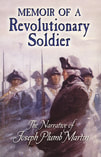
On one occasion, Martin begins telling about a fellow soldier who took pity on one of the enemy troops. The soldier picked up the seriously injured young man and shouldered him in hopes of carrying him to medical care. In doing so, the jostling was probably a little rough on the enemy's injuries, and it occasioned him to make a snarky comment to his "rebel" rescuer. Martin's peer took offense at the man's calling him, a Patriot soldier, a rebel, and he didn't waste any time leaving the man on the side of the trail. The reader feels Martin's empathy for the enemy as he passes by him, choosing not to pick him up himself.
On at least one more occasion, our hero fires at the enemy and has little doubt that he struck his target. While he believes he killed the man, by the time of his writing he hopes with every urge that the man survived the attack.
Today, we might wonder if JPM experienced post-traumatic stress syndrome during his lifetime. There should be little doubt that he did, but the question might be whether or not it was severe. His writing may have been a "clearing" of his conscience in some way. Many of us have family members or acquaintances, whether an elderly relative like my own grandfather with his experiences in the Pacific during the second world war, or with our youngest veterans who return from service in Afghanistan or Iraq. We know they suffer. We know their memories, in some cases, haunt them. We can only hope they do not wait until they are 70 to purge their emotional turmoil.







































